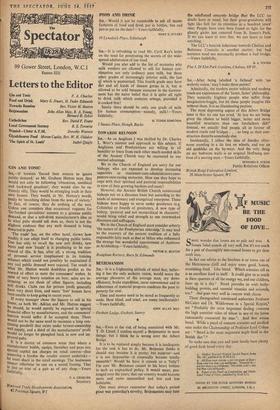Letters to the Editor
Gin and Tonic F. A. Chortler Food and Drink Mary E. Stuart, H. Tudor Edmunds Towards Reunion Rev. Victor H. Beaton Beljemanien John Allan May, B. A. Young,
Bernard B. Sykes
Catholicism Rev. David F. Evans Local Government Secrecy B. S. Townroe Wanted--Ulster A.Y.M. Dorothy Walters Glyndebourne Food Moran Caplat, Rev. W. H. Oldaker 'The Spirit of St. Louis' Isabel Quigly
GIN AND TONIC
brewers 'forced their tenants to ignore Public demand,' as Mr. Graham Hutton says, they would not only be following 'obnoxious, unethical and backward practices'; they would also be ex- tremely silly. They would be strangling trade in their own houses. They would, in Mr. Hutton's words, really be 'snatching defeat from the jaws of victory.' In fact, of course, they do nothing of the sort. Unless one considers that occasional requests for far-fetched specialities' amount to a genuine public demand, or that a soft-drink manufacturer's idea as to what pubs should sell does so, there is not the Slightest evidence that any such demand is being thwarted in pubs.
'The trade' has, on the other hand, shown how readily it can adapt itself to changing public tastes. One has only to recall the new soft drinks, new beers and new 'locals' it is producing to be con- Vtnced of this. It has, after all, a strong tradition of personal service (emphasised in its training scheme) which could not possibly be maintained if any real public demand were rejected. The result is What Mr. Hutton would doubtless predict as the reward of effort to meet the consumers' wishes. In spite of very heavy taxation on beer, sales are in- creasing; so are thosb of other liquors, including Soft drinks. Clubs run for private profit generally have very short lives, and many 'free' houses have been unable to keep going in recent years.
If every manager chose the liquors to sell in his ,house, as both Mr. Adrian and Mr. Hutton suggest ne should, he would merely be exposed to special nancial offers by manufacturers, and the consumers' Interest would suffer if he accepted them. There Would not be the same need to maintain a long con- tinuing goodwill that exists under brewer-ownership and supply, and a third of the manufacturers' profit Would no longer be ploughed back in new and im- proved pubs.
It is a matter of common sense that where a Manufacturer builds, equips, furnishes and pays any Special capital tax charges on retail centres—thus assuming a burden the retailer cannot undertake— he Must share in the retail earnings. The businesses cannot otherwise be run on a sound footing. That Is Just as true of a pub as of any shop.—Yours faithfully,
F. A. CHARL1BR Secretary
National Trade Development Association, 42 Portman. Square, W I


































 Previous page
Previous page